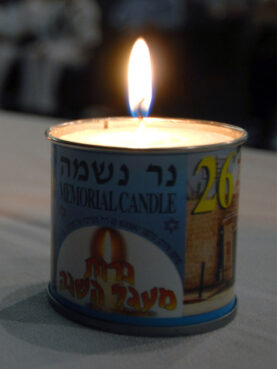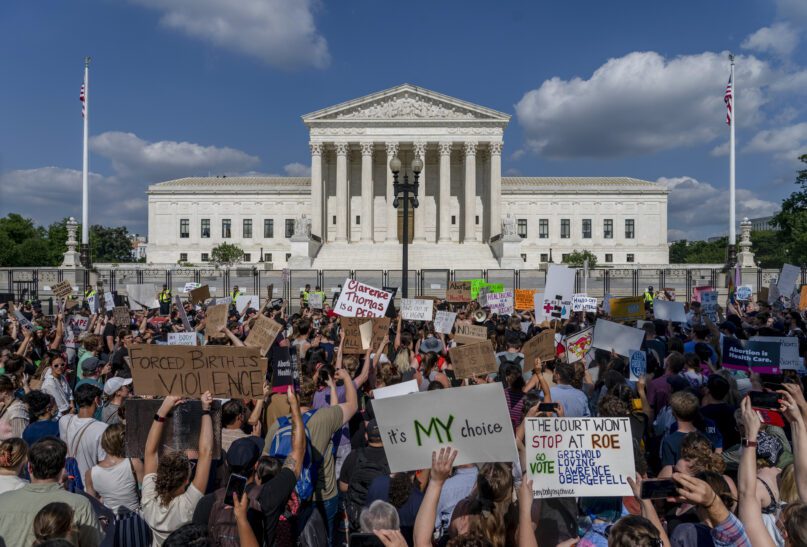(RNS) — U.S. Jews gathered in online forums across the country before sundown on Friday (June 23) to light a candle marking the one-year anniversary of the end of Roe v. Wade, and mourning those who have died because abortions were not available to them.
The Zoom meetings were called a yahrzeit, an ancient Jewish tradition marking the anniversary of a death of a loved one. A yahrzeit typically consists of lighting a special 24-hour candle and saying the Kaddish prayer.
The candles lit Friday are expected to burn into Saturday, June 24, the day last year that the U.S. Supreme Court eliminated the constitutional right to abortion up to about 24 weeks of pregnancy in its Dobbs v. Jackson Women’s Health ruling.
About 250 people participated in the Yahrzeit of Roe Virtual Candle Lighting, sponsored by the National Council of Jewish Women. The 25-minute Zoom conference call was restrained. A candle was lit, a litany read, a prayer recited and a song was sung.
Most Jews, and especially liberal Jews, believe their faith permits and even requires an abortion when the life of the pregnant person is at stake.
“We knew that this was a time that we needed to mark Jewishly,” said Rabbi Danya Ruttenberg, scholar in residence at the National Council of Jewish Women. “And we knew it was a time that demanded ritual because this is a big moment, and it felt that this was the correct moment for honoring and mourning everyone whose lives have been taken because of these horrific government policies.”

A yahrzeit memorial candle. Photo by Mass Communication Specialist 1st Class James E. Foehl/U.S. Navy/Creative Commons
Some 20 states have enacted laws banning or restricting abortion in the wake of Roe’s fall. At least 61 clinics, Planned Parenthood facilities and doctors’ offices stopped offering abortions in the last year, according to The New York Times.
In 2020, the National Council of Jewish Women created “Rabbis for Repro,” a coalition of some 2,500 U.S. rabbis and cantors committed to fighting for reproductive health rights, especially abortion. It has spawned other grassroots coalitions including a new “Jews for Repro NY” campaign. This week it celebrated passage of legislation in New York state that provides legal protection for New York doctors to prescribe and send abortion pills to patients in states that have outlawed abortion.
But on the Zoom conference call Friday, many were in a much more somber mood.
Asked what they needed to deepen their commitment to the fight for abortion rights, participants typed into the chat function: “patience,” “stamina,” “community,” “allies,” and “righteous anger.”
Nearly two-thirds of Americans support legal abortion, including majorities of religious Americans, according to a recent PRRI poll. Among the religious groups most supportive of abortion rights are Unitarian Universalists, religiously unaffiliated Americans and Jews.
RELATED: Poll: Support for abortion rights is strong, even among most religious groups
Several religious groups have filed nearly a dozen challenges to abortion restrictions now making their way through state and federal courts, insisting abortion bans violate their religious freedom. They hope they can persuade courts to grant religious exemptions to abortion bans, if not strike them down altogether.
The online conferences made a point of mourning for people who died giving birth, either because they couldn’t terminate their medically risky pregnancies promptly or couldn’t travel out of state to get the care they needed.
“Forced birth takes lives, and it takes lives disproportionately of Black women, Indigenous women, those who are struggling to get by,” said Ruttenberg. “We’re never going to know everyone’s name, we’re never going to know everybody’s identity. But we need to honor them.” The yahrzeit candle, she said, was one way their memory can “illuminate our lives today.”
RELATED: How Black clergy are reframing approach on abortion with congregations





